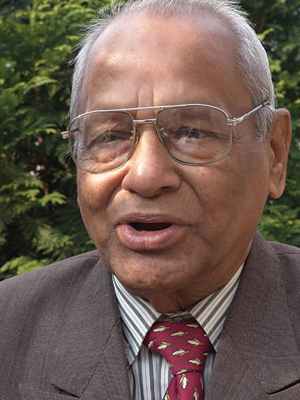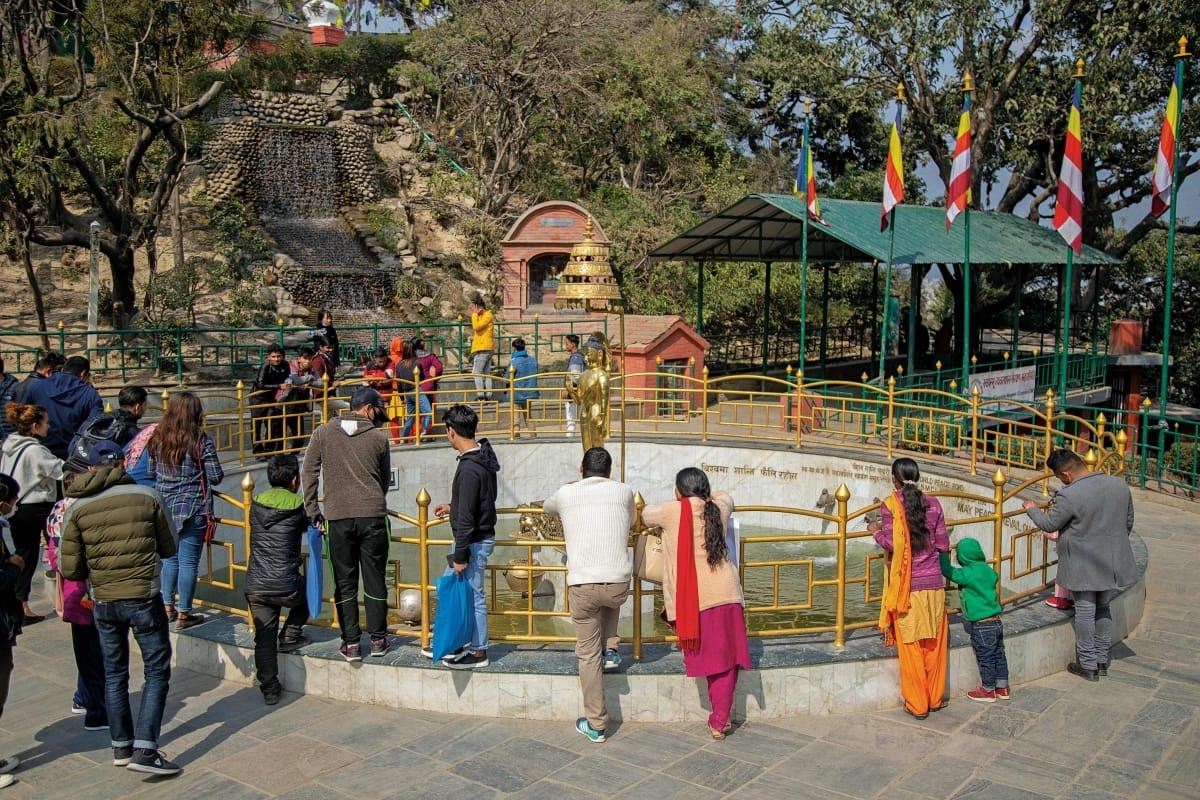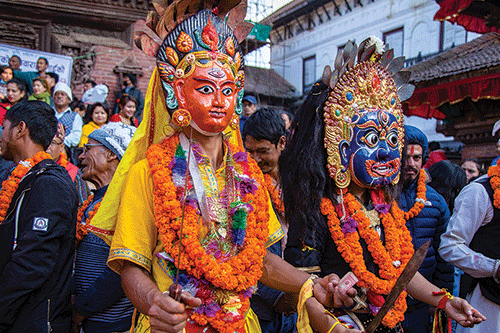Diamond Shumsher Rana, author of popular books in Nepali, like “Basanti” and “Seto Bagh” has also thored five other books and is now currently working on his autobiography. It has been two months now since he started on the book and according to him, ‘has no idea whether he will finish the book or the book will finish him.’ This nearly 90 year old veteran writer, despite being hindered by diabetes and blood pressure is still wheeling with his life and work accepting the health hazards as part of old age. Humble and down to earth, Diamond Shumshere Rana makes delightful conversation. He earns his living by writing books.
 How are you related to Jung Bahadur Rana?
How are you related to Jung Bahadur Rana?
Jung Bahadur Rana had seven brothers, the youngest being Bir Shumsher. Bir shumsher had seventeen sons and I am the descendent of Sher Shumsher, who was the fourteenth son of Bir Shumsher. I am the grandson of Sher Shumsher.
What was it like working in the army then?
I was in the army of the Ranas but due to the political situation then, I revolted against the Rana oligarcy. Thus, they jailed me and even court marshalled me for which I received punishment. But by God’s grace, or should I say that things changed in such a way, that Congress started a revolution against the regime and the masses also turned against them. I was jailed, but saved from being killed because Rana rule came to an end. The Rana government was supposed to hang me, but they lost power just in time and I survived.
Tell us about your childhood.
I was born in Palpa and when I was 6 months old, I was brought to Kathmandu. My ancestral house was in Thapathali. We shifted to Kupondole when I was three or four years old and I do remember that. I studied in Patan school and at that time we had to do matriculation but when I was about to appear for the matriculation exam, my father died and I had to join the army. I enlisted at the age of twenty or twenty one, as a lieutenant and I served for nearly twenty years in the army before retiring as a major. Soon after I joined the army, war broke out and I couldn’t sit for my SLC exam. Instead, I was sent for my training to a military school in India.
What kind of life did the Ranas live back then?
Rana government was autocratic and they always considered themselves to be above the common masses. The Ranas were on one side and everybody else on the other side. During my time, there was no real scope for work or for writing and our guardians would get angry if we were too inclined towards studies. Pandits would be there but their work was to salute rather than to teach. A salute would make the Ranas happy. This is one of the reasons more Ranas were into hunting rather than working or studying.
Tell us about your book “Seto Bagh”.
I couldn’t continue my education academically because I couldn’t leave the army and join college full time. So I continued with my education privately by keeping a professor in English. I studied world literature and was influenced to the extent that I went on to write the book, “Basanti”. During the Rana period one had to take permission to publish a book and that book did not get the green signal. Why, I could not understand at that time because the book was not against the Ranas or their oligarchy. I think my book did not receive permission to be published because I was in the army and an official in an army, writing a book was not acceptible to the top Brass. Later, I felt it was upon this issue that my dissatisfaction with the Rana oligarcy and their policy took birth. They were of the opinion that if everybody was educated then the people might become knowledgeable and rise up to overthrow them. Rather than becoming the king of the blind, it is better to be a friend of the educated, knowledgeable people. That’s my opinion. I found the solution to my problem by not bothering about them and got the book published in India. I brought the books here later, after the Rana rulers were removed from power.
What research did you do for ‘Seto Bagh’?
Everybody asks this question and I think you are right in asking such a question. Let me tell you that the subject matter of the book is something that I have been hearing about since I was four years old; from my father, grandfather and great grandfather. It is their history, that’s why little research was enough for me to come up with the book. Up until then, foreigners wrote our history but what I have incorporated in my book, is factual. I have gathered information from real people and that’s why what I have heard, what was told to me, or what I have written in my book is authentic. With regard to the subject matter I have written in my book, I have doubts if anyone can say it better or gather more information than I have, because it is my own history, you see. It is all about my own family.
Did you write that book to document history or did you intend to change people’s minds by writing it?
I was in jail and everybody was writing. People were writing novels, poems, history and even a dictionary, so I too had to write something. I wanted to write about my belief and trust in democratic socialism. I strongly believe that without democratic socialism, a country can never progress. And in order to tell the readers and citizens how a country can move ahead, I took the subject I was good at. Since I was a Rana, I had the best knowledge on Ranas. So by choosing the subject of Ranas, I fulfilled the duty of democratic socialism. Let me first tell you the meaning of Seto Bagh. Jung Bahadur Rana, during the last phase of his life started seeing everything as white, and when he went to kill a tiger he thought it was white in color. Even the peacock perched nearby looked white to him. During his reign, his rule was such that it was hoped in Nepal everything would be good, his family and lineage would do well. And saying so, he ruled for 32 years. But in the end, his eleven loving sons were killed because one of his brothers took over the kingdom. And then this brother became like him, and anyone who went against him was wiped out or had to leave the country. If during his time, Jung Bahadur had introduced democratic socialism, today the country would have really progressed and his descendents or his brothers’ family’s descendents could have even won the polls and become the presidents of the country. But he did exactly the opposite and everything came to an end— his rule, his family. Without education, no country can progress and that’s why, by writing “Seto Bagh”, I am telling the citizens not to make the same mistake that Jung Bahadur made. Jung Bahadur was a great man, very hard working and he sincerely wished to serve the country and he wanted his family to earn great fame and respect, but his methods were wrong. He thought that by trying to keep the Rana oligarcy intact he was doing something good for his family but he was wrong, because he created so much more problems within his own family. The amount of problems and pain that his family had to face, I think, no one has had to face.
Can you tell me about the translation of the book?
My book was translated by Greta Rana, who is my daughter-in-law. She’s from Britain. She was learning Nepali and I was writing in Nepali and since we were related we met and on our mutual understanding, she translated my book and I am grateful to her for her work.
Family?
I have a daughter who is a gynecologist. Raghu Shumsher Rana is my son and he is an officer in the Khadya Sansthan. Both me and my wife are diabetic patients, blood pressure too and if I don’t take NRs.34 worth of medicine daily, I will die and I have to go for checkups spending a lot of money. We are both old, I am nearing 90 and she is in her 80s.
Who were your contemporaries?
Education was not emphasized during that time and the writing profession not appreciated. There were people but I can’t really compare myself with them. There was Lekhnath, Devkota and others.
Were you associated with B. P Koirala?
I consider B.P Koirala as the leader and my interest in democratic socialism grew immensely after meeting with him. And that’s how I came to write Seto Bagh. When I would meet him, I would be totally dominated by him, I should say. Around the age of 40 to 45, I followed him and his democratic socialism and that’s why, whatever he has taught, he has said remains with me and I cannot cross that line. I cannot forget or give up those ideals. I had started towing this line when the Panchayatis imprisoned me. My last imprisonment was for six years and during those six years, I fought for democracy. I really had to struggle and to tell you the truth, I don’t think there is any prison here in this valley where I have not been imprisoned. So I struggled for nearly 40 years and I was practically living my life in jail. Finally during the reign of King Birendra I decided it was time to quit so I resigned myself from politics.
Can you shed some light on Bal Krishna Sama?
Bal Krishna Sama was my cousin. I was a captain and he was a major in the Nepali army. Both of us participated in the democratic movement and we were both imprisoned in the Singha Durbar. We were of course, kept separately during our incarceration. They did not court marshall him because he was a senior officer, a veteran and in all ways he was above me. That’s the reason why he was kept separately. As for me, I was tortured and made an example, I assume to scare others. They wanted to court marshall me, but before the verdict could come into effect, the Rana oligarcy was overthrown by Congress and the people. Sama’s real name was Bal Krishna Shumsher Jung Bahadur Rana and while we together in prison in Singha Durbar, he told me that he was changing his name. He was a first class writer, poet, playwright and an artist with vast knowledge.
Do you think you have been honored for your contribution towards Nepal’s history?
I was honored after I wrote “Seto Bagh”. For that book, I received money and awards and after that I started getting deeply involved in literature. Otherwise, honors don’t interest me now. My eyes are weak and after spending NRs.7000 I had it operated once. Thereafter I wrote one book but it also gave trouble. I had then decided not to write again, but a group of group came to me and insisted that I write. They even offered to help me financially. That’s why I decided to write again. So I am writing my autobiography and to get my eyes treated, it seems I have to go to America, Japan or Bangkok. I need to spend lakhs of rupees on my eye treatment. But now that I am very old, I think it’s not worth spending so much, although everyone suggests that I go for the treatment.









